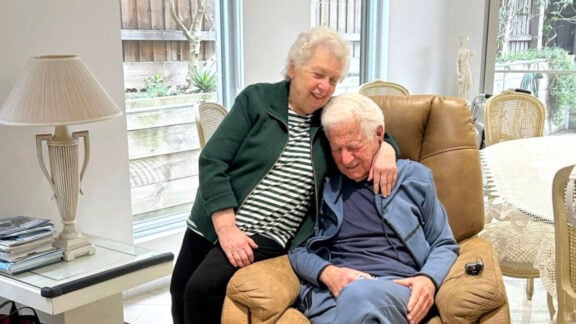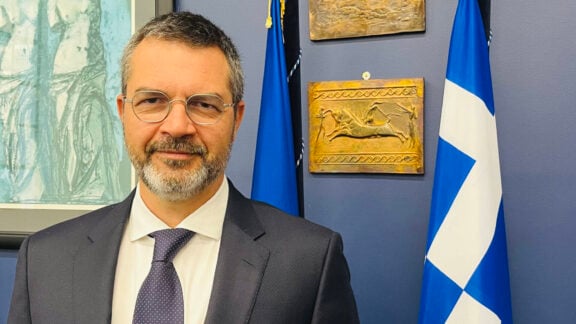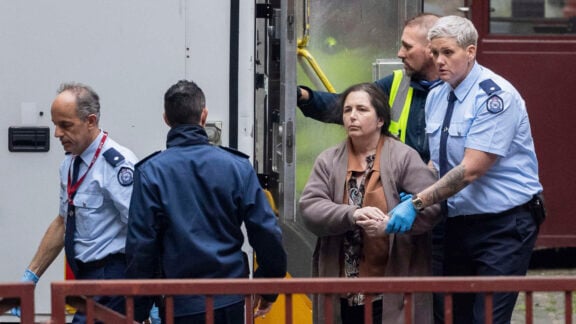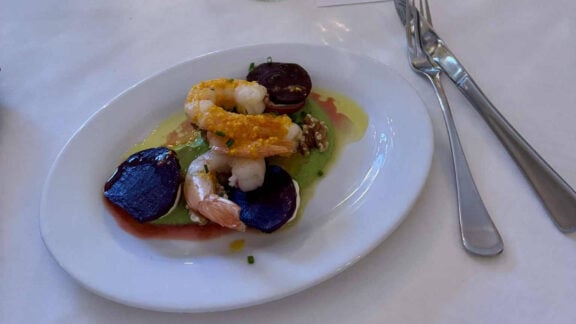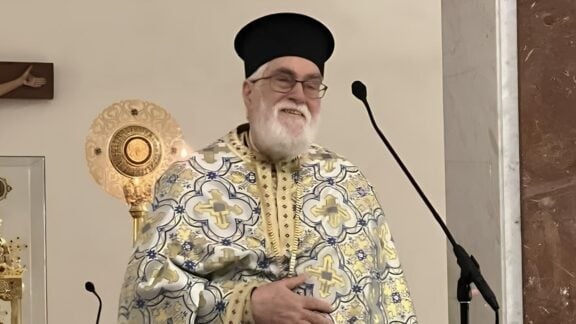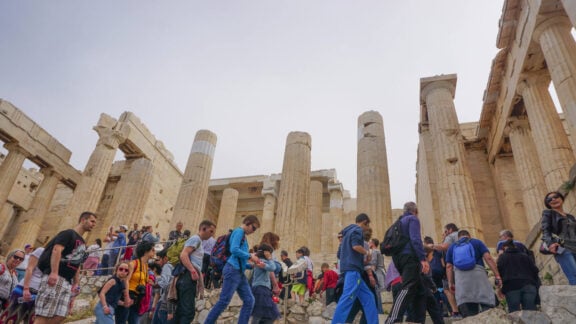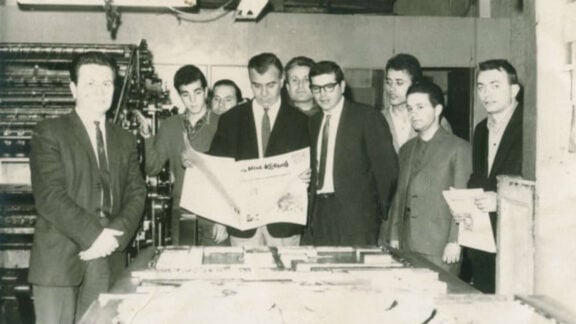A partnership with the University of New South Wales and the State Library of NSW is producing an archival collection, gathering material and interviewing Greeks that came to Australia in the 50s and 60s.
A number of years have passed since the idea was conceived by Associate Professor Nicholas Doumanis from the School of Humanities & Languages in the Faculty of Arts & Social Sciences at the UNSW.
But the fundraising event that was held in Sydney in March and run by Paul Nicolaou has helped kick start the process, Professor Doumanis tells Neos Kosmos.
“The fundraiser helped us raise $100,000 and a lot of the Greek community came,” he says.
“We had people like former Socceroo captain Peter Raskopoulos on behalf of his family donate $10,000. Certainly, we want to honour these people because we can actually start doing things now.”
The fundraiser also saw the Rafty family donate two subject-signed works of the late artist Tony Rafty (born Anthony Raftopoulos) who passed away three days short of his 100th birthday on October 9, 2015. The world-renowned Greek-Australian’s drawings raised $3,500. One drawing was of former NSW Premier Joe (JJ) Cahill and the other was of four-time Greek Prime Minister Konstantinos G. Karamanlis. Karamanlis was the first Greek Head of
State to visit Australia in March 1982 and was drawn by Rafty at the reception arranged by the Greek community at the Sydney Town Hall.
The portrait of JJ Cahill hung on the walls of the family home for 40 years. Tony’s son Andrew chose it to be auctioned because it contained several Greek connections. Cahill was NSW Premier from 1952 to his death in office in 1959 and that decade was the highest migration of Greeks to Australia.
Many public works projects were commenced during Cahill’s tenure as NSW Premier, including Sydney’s jewel- the Sydney Opera House. These public works provided employment opportunities for thousands of newly arrived Greeks.
Andrew Rafty told Neos Komos that his family were eager to be involved in the Greek-Australian archive.
“We donated two of dad’s drawings because it’s easy to do and I knew they would raise good money for a good cause,” he says.
“If dad was still alive he would have donated the drawings; so, we did it on his behalf. It is a great cause; the Greek Australian contribution has not been really documented and it should be, and dad was a Greek- Australian.
“Like all migrant groups, the Greeks have contributed to where Australia is today and with the passing of time unless it’s documented it will be lost forever. This is why this project is so important. It hasn’t been done before and it has to be there for future generations.”
Professor Doumanis says the archive will help build a solid historical narrative that tells the story of the Greeks that came to Australia.
“The people who immigrated here in the 1950s are passing away now,” he says.
“We will forget their struggles and what they did for us. They come from a war-torn country which was poverty stricken to give their children a better chance. Nearly all, most of them, succeeded. They went from peasant to working class to middle class, all in one generation. They are a success story and it can’t be ignored.
“I’m hoping to get the support of the most important institutions, like the Greek Orthodox Community of NSW and other Greek-Australian institutions involved. They’re all supportive, and all of them are important. They all say something about how we have reconstituted ourselves here as a community.”
Besides the Greek Church, Doumanis says he is talking to other institutions of the ‘Kinotita’ (Community) like the ‘Silogi’ – (the brotherhoods).
“I’m encouraging these groups to organise their stuff and consider submitting it to the State Library, so we’ll forever know what these people did,” he says
“These organisations often did things like philanthropic endeavours. For example, they’d send back money to Greece to help build something. Or if there was an earthquake they’d send emergency aid.”
Doumanis added, “Greeks are unusual as migrants, they’re so keen to organise and to form organisations – philanthropic ones, regional ones, political ones. They see the need to do that. When you come to this country it’s very good, but it’s alienating. You want to mix with your own, so they organised dances, balls, picnics and soccer clubs. Talking to these organisations is important because they tried to create their own Greek community.”
One of the more notable findings Doumanis has come across while interviewing people is a number of untold philanthropic feats that occurred during World War Two including the story of Emilianos Vrisakis.
“He was the Consul General in the 1940s,” he says. “He was effectively the go between the Australian Government and Greece. Because Greece was occupied by Germany, there were problems, including a famine in Athens. This important man got the government to understand this and to feed people. He was a leader in the community. Now not too many people know that. This project has brought this to life.”
Professor Doumanis believes that Australian historians haven’t always appreciated the full story of the Greek migrant experience.
“They think Greek history is the history of Greece,” he says. “But it’s also about the people who left Greece. Since ancient times Greeks have always been leaving. There’s a pattern, they go away and set up a Greek society. They set up Greek cities in ancient times.
“A few centuries ago they’d go to places like Vienna or Russia or Smyrna and they would continue speaking Greek. And now in the 20th Century, they kept doing it.”
So why do Greeks keep on leaving Greece? Why are there only about 10 million Greeks in Greece? Professor Doumanis says the answers are crucial to the Greek-Australian story the archive hopes to record.
“The reason is that Greece can’t keep people,” he says. “It’s a pile of rocks. Only 20 per cent of it is farmable. The land makes you migrate, but it also makes you versatile. If you live in a place that is not promising in terms of its natural environment, you have to be more innovative. You have to try things that are entrepreneurial.”
“So, when Greeks came to Australia, they would say, ‘there was factory work, but what else can I do? My English is limited but it doesn’t really require a lot of English to run a fish and chip shop.’ Then the fish and chip shops were overtaken by the mixed business. But Greeks got out of those because the big multi nationals came in and took over. Some of them got stuck but a lot of them got out. They sold to newcomers like the Vietnamese. But they were always thinking, ‘what do I do next?'”
It’s not only historians that don’t know the full history of Greek Australians, Professor Doumanis believes the younger generations don’t know crucial details of their own parents’ and grandparents’ struggles.
“What I want to do with this project is I want to talk to as many Greeks as I can and ask them specifics,” he says.
“Most Greek Australians won’t know which ship their mother or father came on. They won’t know a date, what decade or why their parents or grandparents even came. They never asked, ‘why did you come?’ But they know that they came.
“You get surprises when you ask, ‘what ship did you come on?’ They say, ‘I came by plane actually. ‘How come you came by plane?’ They tell me, ‘because the Suez Canal was blocked.’ There’s a lot of details that people don’t know. There’s a lot of things we can learn by talking to the oldies.”
To learn more about the archive and how your families’ history can be preserved, contact Associate Professor Nick Doumanis at n.doumanis@unsw.edu.au or to donate go to this website: https://donate.grassrootz.com/unswaustralia/greek-australian-archive

